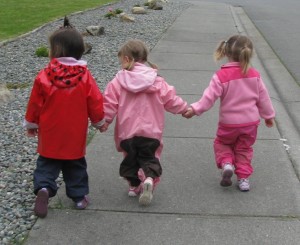The Magic of Friends
 During the preschool years children’s brains grow faster than at any other time in their lives, but we sometimes forget that their hearts, that is emotions and feelings, are also developing. We need to give kids the opportunities for building their social and emotional skills as well as their muscles and brains. Encouraging connections to friends is one way of supporting young children.
During the preschool years children’s brains grow faster than at any other time in their lives, but we sometimes forget that their hearts, that is emotions and feelings, are also developing. We need to give kids the opportunities for building their social and emotional skills as well as their muscles and brains. Encouraging connections to friends is one way of supporting young children.
For children, having friends is so magical that many of them will imagine a friend who is with them all the time. In Insights for Parents: Midnight Monsters and Imaginary Companions, Dr. Lawrence Kutner says, “Imaginary companions are an integral part of many children’s lives. They provide comfort in times of stress, companionship when they’re lonely, someone to boss around when they feel powerless, and someone to blame for the broken lamp in the living room. Most important, an imaginary companion is a tool young children use to help them make sense of the adult world.” With all those advantages, it’s no wonder kids have imaginary friends.
Some children have a much easier time when it comes to relationship skills. They seem to know already about eye contact, asking others their name, taking turns, and sharing. They are eager to start a conversation or join in when they see a group playing. Making friends can be a struggle for other children but friendship skills can be taught, and as with so many others, they get better with practice. Reading stories about friends, recruiting stuffed animals, and modeling friend skills are some strategies to help kids learn what they need to know.
While having friends is magical, not having them can leave children feeling isolated and terribly unhappy. With support, we can help kids learn and practice so that their friends are real. How have you helped your child have friends?
